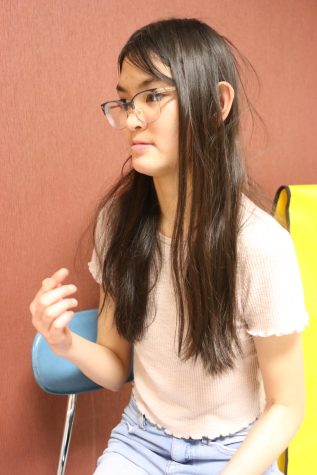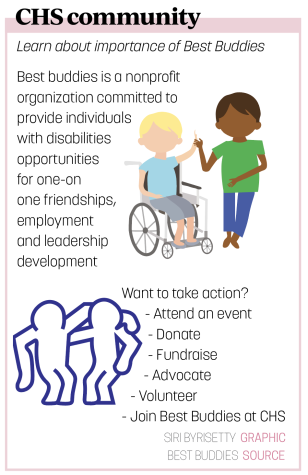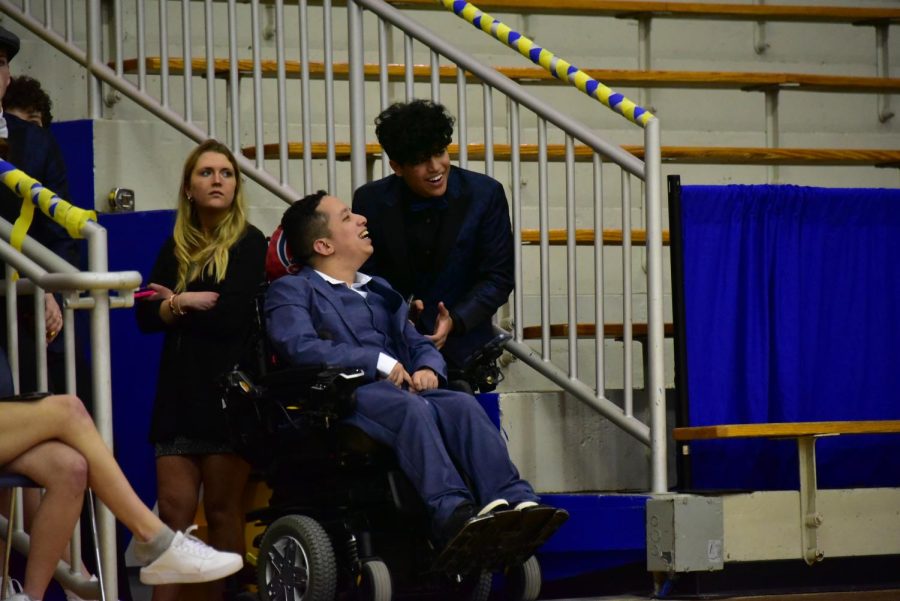According to the CDC, one in 33 people are born with a birth defect. Senior Jesus Andres Sanchez was one of those people. Because of this, he needs some accommodations to help him succeed, such as using a power chair and his iPad or iPhone to communicate.
“I was born prematurely and my brain lacked oxygen,” Andres said, “(so) the doctors did not have much hope that I would live. Since I was a baby, I started therapies and I managed to do many things. I went to a regular school, I walked at 8 years of age with a walker.”
Andres and his family moved from Venezuela to America over three years ago. Andres said he and his family moved due to many factors, including the challenges he faced because of his disability.
“A lot of people made fun of me,” he said. “One person said ‘Hey, look at that guy; he can’t walk.’ Comments like that hurt my feelings and make me sad. People in America are more understanding than people in Venezuela.”
Andres isn’t alone in this aspect either; and one in four disabled people will face a form of discrimination during their life. According to the U.S. Department of Education, discrimination against disabled people can take many forms, such as slurs, taunts, stereotypes or name-calling, as well as disability-motivated physical threats, attacks or other hateful conduct.

Junior Annalise Moore, who was born with cerebral palsy, said she has not faced any harassment or discrimination due to her disability. However, she said she had one issue with the way people treated her.
“I think people treat me differently and they set lower standards for me,” Moore said. “People usually try to make things easier for me. People should not have lower standards for disabled people.”
Kellie Freeman, the Carmel Clay Schools transitional coordinator, provides services students with disabilities might need. She said she has seen how others treat those with disabilities.
“It’s one of those things and you see it a lot, we call it the ‘head tilt talk’ when somebody meets someone and they talk down to them,” Freeman said. “And I know people do it out of the kindness of their heart—no one does it maliciously—but it’s like you feel sorry for that person or you’re pitying that person.”
Freeman elaborated on the feeling this can create.
“You know somebody is feeling a little frustrated because they know they are not being treated like everybody else,” she said. “Once you get into that realm of thinking, you can see the difference. They are really proud of what they’ve just done because they’ve done it.”
Some people take advantage of those with disabilities. Andres recalled an experience when someone used him because of his disability.
“A girl dated me to win Homecoming Queen,” he said. “I was so excited and happy; she gave me a gift and everything. When she didn’t win Homecoming Queen, she texts me and says, ‘I’m sorry I don’t want to date you anymore. I have a boyfriend.’ I think she wanted to use me to get many votes for her because of my disability. She dated me for those votes.”
Because of the challenges many students with disabilities face at school, many clubs have been made for students with disabilities to make friends or have a safe place. Andres is involved with the Best Buddies program, an international organization that, according to their website, is “dedicated to ending the social, physical and economic isolation of the 200 million people with intellectual and developmental disabilities.”

“Best Buddies is important because it gives special needs people a place to hang out and make friends,” Andres said. “I help prepare club meetings.”
Freeman said exposure to disability in schools helps break down the stigma.
“There is a lot of exposure to people with disabilities. At Carmel, there are a lot of typical peers who interact with people with disabilities and that’s a very accepted thing to do. It’s what people do and want to do. They’re involved in Best Buddies, and I don’t see that in a lot of other school corporations,” she said.
Despite some negative interactions, overall, Andres said, “I am very happy here with many friends and in the best school. I love Carmel, people are very kind to me and my family. Best Buddies has changed my life. I’ve made so many new friends.”
Freeman said it’s important to treat people with disabilities as people first and think about their disabilities second.
“It’s easy to think of a person with Down syndrome or autism. ‘Well, they can’t’…‘They must not be able to…’ But I think it’s really important to think of that individual like anybody else. You don’t know what they can do.”
In the end, Andres said, “I want everyone to know that everyone is the same.”

































![AI in films like "The Brutalist" is convenient, but shouldn’t take priority [opinion]](https://hilite.org/wp-content/uploads/2025/02/catherine-cover-1200x471.jpg)









































![Review: “The Immortal Soul Salvage Yard:” A criminally underrated poetry collection [MUSE]](https://hilite.org/wp-content/uploads/2025/03/71cju6TvqmL._AC_UF10001000_QL80_.jpg)
![Review: "Dog Man" is Unapologetically Chaotic [MUSE]](https://hilite.org/wp-content/uploads/2025/03/dogman-1200x700.jpg)
![Review: "Ne Zha 2": The WeChat family reunion I didn’t know I needed [MUSE]](https://hilite.org/wp-content/uploads/2025/03/unnamed-4.png)
![Review in Print: Maripaz Villar brings a delightfully unique style to the world of WEBTOON [MUSE]](https://hilite.org/wp-content/uploads/2023/12/maripazcover-1200x960.jpg)
![Review: “The Sword of Kaigen” is a masterpiece [MUSE]](https://hilite.org/wp-content/uploads/2023/11/Screenshot-2023-11-26-201051.png)
![Review: Gateron Oil Kings, great linear switches, okay price [MUSE]](https://hilite.org/wp-content/uploads/2023/11/Screenshot-2023-11-26-200553.png)
![Review: “A Haunting in Venice” is a significant improvement from other Agatha Christie adaptations [MUSE]](https://hilite.org/wp-content/uploads/2023/11/e7ee2938a6d422669771bce6d8088521.jpg)
![Review: A Thanksgiving story from elementary school, still just as interesting [MUSE]](https://hilite.org/wp-content/uploads/2023/11/Screenshot-2023-11-26-195514-987x1200.png)
![Review: "When I Fly Towards You", cute, uplifting youth drama [MUSE]](https://hilite.org/wp-content/uploads/2023/09/When-I-Fly-Towards-You-Chinese-drama.png)
![Postcards from Muse: Hawaii Travel Diary [MUSE]](https://hilite.org/wp-content/uploads/2023/09/My-project-1-1200x1200.jpg)
![Review: "Ladybug & Cat Noir: The Movie," departure from original show [MUSE]](https://hilite.org/wp-content/uploads/2023/09/Ladybug__Cat_Noir_-_The_Movie_poster.jpg)
![Review in Print: "Hidden Love" is the cute, uplifting drama everyone needs [MUSE]](https://hilite.org/wp-content/uploads/2023/09/hiddenlovecover-e1693597208225-1030x1200.png)
![Review in Print: "Heartstopper" is the heartwarming queer romance we all need [MUSE]](https://hilite.org/wp-content/uploads/2023/08/museheartstoppercover-1200x654.png)




